Go back
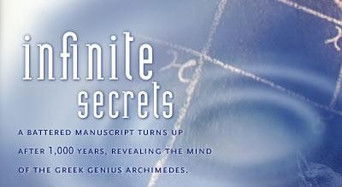
Infinite Secrets
Episode number: 1
Overview: A battered manuscript turns up after 1000 years revealing the mind of the Greek genius Archimedes
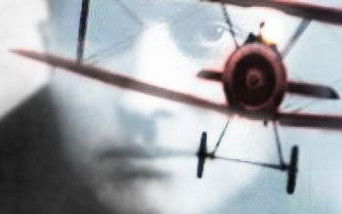
Who Killed the Red Baron?
Episode number: 2
Overview: Forensic experts investigate the most famous aviation mystery of World War 1.

The Elegant Universe: Einstein's Dream (1)
Episode number: 3
Overview: Part 1, "Einstein's Dream," introduces string theory and shows how modern physics—composed of two theories that are ferociously incompatible—reached its schizophrenic impasse: One theory, general relativity, successfully describes big things like stars and galaxies, while another, quantum mechanics, is equally successful at explaining small things like atoms and subatomic particles. Albert Einstein, the inventor of general relativity, dreamed of finding a single theory that would embrace all of nature's laws. But in this quest for the so-called unified theory, Einstein came up empty-handed, and the conflict between general relativity and quantum mechanics has stymied all who've followed. That is, until the discovery of string theory.

The Elegant Universe: String's the Thing (2)
Episode number: 4
Overview: Part 2, "String's the Thing," opens with a whimsical scene in a movie theater in which the history of the universe runs backwards to the Big Bang, the moment at which general relativity and quantum mechanics both came into play, and therefore the point at which our conventional model of reality breaks down. Then it's string theory to the rescue as Greene describes the steps that led from a forgotten 200-year-old mathematical formula to the first glimmerings of strings—quivering strands of energy whose different vibrations give rise to quarks, electrons, photons, and all other elementary particles. Strings are truly tiny, being smaller than an atom by the same factor that a tree is smaller than the solar system. But, as Greene explains, they are able to combine the laws of the large and the laws of the small into a proposal for a single, harmonious theory of everything.

The Elegant Universe: Welcome to the 11th Dimension (3)
Episode number: 5
Overview: Part 3 of "The Elegant Universe” with host Brian Greene shows how Edward Witten of Princeton's Institute for Advanced Study, aided by others, revolutionized string theory by successfully uniting the five different versions into a single theory that is cryptically named "M-theory," a development that requires a total of eleven dimensions. Ten...eleven...who's counting? But the new 11th dimension implies that strings can come in shapes called membranes, or "branes" for short. These have truly science fiction-like qualities, since in principle they can be as large as the universe. A brane can even be a universe—a parallel universe—and we may be living on one right now.
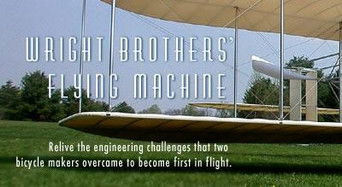
Wright Brothers' Flying Machine
Episode number: 6
Overview: Relive the engineering challenges that two bicycle makers overcame to become the first in flight.
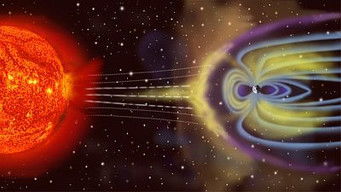
Magnetic Storm
Episode number: 7
Overview: Is the magnetic field protecting Earth from deadly radiation about to reverse direction or even dissapear?

Volcano Above the Clouds
Episode number: 8
Overview: Join a scientific expedition to the glacier-capped summit of Kilimanjaro, Africa's tallest mountain.

MARS Dead or Alive
Episode number: 9
Overview: Go inside NASA's risky field trip to the red planet in this tense and dramatic behind-the-scenes chronicle of the $820 million Mars Exploration Rover (MER) project.

Secrets of the Crocodile Caves
Episode number: 10
Overview: Rare lemurs and crocodiles with bizarre cave-dwelling behavior draw scientists to remote corner of Madagascar.

Dogs and More Dogs
Episode number: 11
Overview: NOVA goes beyond the wagging tails and floppy ears to reveal surprising insights into the origin and evolutionary strategy of our canine companions. From a wolf research facility in rural Indiana to New York’s Westminster Dog Show, you’ll discover some amazing dog facts. Did you know the Saluki can beat any other mammal on earth in a three-mile race? That dogs developed spots for a specific reason? And that their evolution is helping us learn about our own?
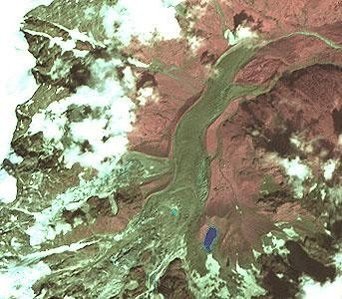
Descent Into the Ice
Episode number: 12
Overview: A team of "glacionauts" verntures into a labyrinth of unexplored and hazardous glacier caves on France's Mt. Blanc.
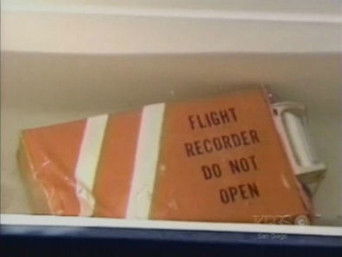
Crash of Flight 111
Episode number: 13
Overview: One of the most exhaustive investigations in aviation history reveals telling clues to the cause of a dissaster off Nova Scotia.
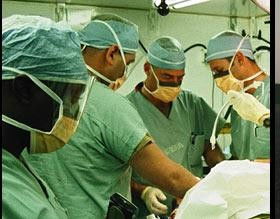
Life and Death in the War Zone
Episode number: 14
Overview: While other reporters were embedded in fighting units during the Iraq War, NOVA was covering the emergency medical response, living night and day with the doctors, nurses, and medics in a frontline Combat Support Hospital (CSH). The program captures a period of the conflict in April and May of 2003 when CSH units faced a deluge of injured Iraqi soldiers and civilians who had little support from their country's collapsed health-care system.
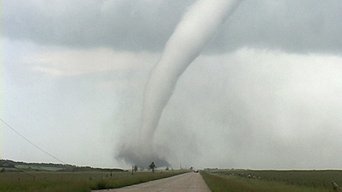
Hunt for the Supertwister
Episode number: 15
Overview: Scientists, meteorologists and storm chasers try to uncover the secrets of F5 tornadoes, the largest, most powerful and most dangerous on Earth. Included are looks at how funnels form and the devastating 2003 tornado in Moore, Oklahoma, plus "tornado tourists," who pay companies to take them to the ferocious phenomena to see them first-hand.

World in the Balance: The People Paradox (1)
Episode number: 16
Overview: Nova investigates the impact of forces that are radically changing populations in both rich and poor nations.

World in the Balance: China Revs Up (2)
Episode number: 17
Overview: Nova investigates the impact of forces that are radically changing populations in both rich and poor nations.

Battle Plan Under Fire
Episode number: 18
Overview: Can the US military's high tech weaponry prevail against insurgants.